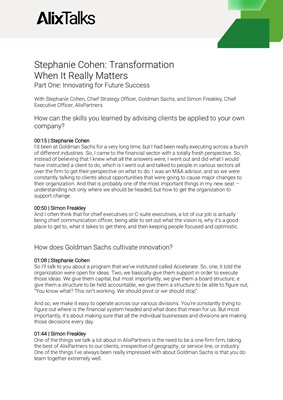
Stephanie Cohen: Transformation
When It Really Matters
Part Three: Perpetuating Culture During Change
With Stephanie Cohen, Goldman Sachs, Chief Strategy Officer, Simon Freakley, Chief
Executive Officer, AlixPartners
How do you maintain a positive business culture during transformation?
00:15 | Simon Freakley
Like you, most of our growth has come through lateral hiring. It's come from organic growth
rather than acquisition growth. How have you managed to keep such a strong culture at
Goldman Sachs, given the scale of your lateral hiring?
00:27 | Stephanie Cohen
One of the traps you can get yourself in is hiring only people that are like yourself, because
that feels like a culture fit. But I think the point really is, are you additive to the culture? So, as
we have been growing the population of our engineers, as we have been growing things like
the consumer business, we're bringing in people from completely outside of the financial
sector, and we think that's additive to the culture.
Why are diversity and inclusion important while shaping a
corporate culture?
00:50 | Stephanie Cohen
We've been around for 150 years, we want to be around for the next 150 years, and we're not
going to be successful if we don't have diverse voices at the table. You really do have to
embed it into your business. So, we started a program called Launch with GS, which is our
commitment to closing the gender investing gap. 85% to 90% of all venture capital funding
goes to all male founded teams. The world is 50/50 - that is an imbalance that represents a
great investment opportunity. So, we said we're going to invest directly in women founded,
owned and led businesses. We're going to raise client capital to invest in women managers,
and we're going to build an ecosystem to support that. The second piece of it is that you need
to measure and hold people accountable. So, the same way that having high market share,
high margins, high returns is important is the same thing about diversity.
01:34 | Simon Freakley
So, we feel exactly the same. We feel that diversity and inclusion is really a survival issue for
any organization. If any business ends up being a nondiverse business, then it's not just the
obvious elements of diversity, but diversity of thinking doesn't happen. And if we're not
composed as our clients are composed, we're just not thinking about the whole problem.